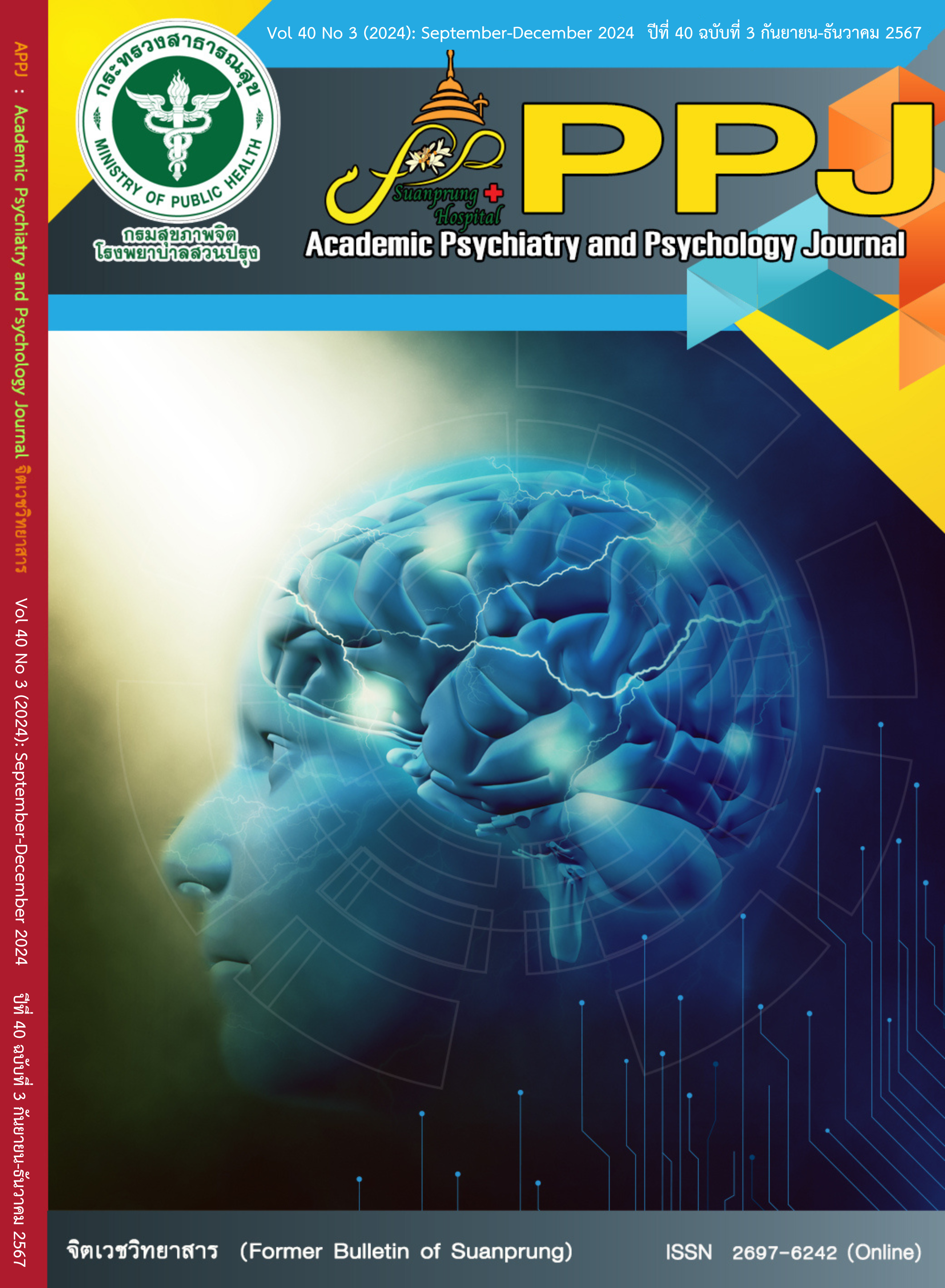Effect of the Multi-Channel Motivational Enhancement Therapy Program on Amphetamine Use Behaviors Among Persons with Amphetamine Use Disorder
Main Article Content
Abstract
Objective: This research aimed to investigate the effect of the multi-channel motivational enhancement therapy program on amphetamine use behaviors among persons with amphetamine use disorder.
Materials and methods: This research is a quasi-experimental study. The sample group consisted of 32 individuals receiving inpatient treatment for amphetamine use disorder at the Nakhon Ratchasima Rajanagarindra Psychiatric Hospital. The research tools included: 1) a personal information questionnaire, 2) the alcohol, smoking and substance involvement screening test (ASSIST-ATS), 3) the stages of change readiness and treatment eagerness scale (SOCRATES-8A), and 4) the multi-channel motivational enhancement therapy program. Data analysis was performed using descriptive statistics, independent sample t-tests, and paired t-tests.
Results: The results of the research revealed that the mean score for amphetamine use behavior in the experimental group in the four-week period after receiving the multi-channel motivational enhancement therapy program ( = 9.75, SD = 5.16) was lower than that before receiving the program ( = 28.63, SD = 1.78) with statistical significance (p < .01) and was lower than that of the control group ( = 17.13, SD = 7.94) with statistical significance (p < .05)
Conclusion: The multi-channel motivational enhancement therapy program can enhance motivation and can help reduce amphetamine use behavior.
Article Details

This work is licensed under a Creative Commons Attribution-NonCommercial-NoDerivatives 4.0 International License.
บทความหลังผ่านการปรับแก้จากกองบรรณาธิการแล้ว เป็นลิขสิทธ์ของวารสารจิตเวชวิทยาสาร โรงพยาบาลสวนปรุง กรมสุขภาพจิต กระทรวงสาธารณสุข ห้ามเผยแพร่เพื่อประโยชน์ทางการค้าโดยไม่ได้รับอนุญาต แต่อนุญาตให้เผยแพร่บทความดังกล่าวเพื่อประโยชน์ทางการศึกษาแก่ประชาชนทั่วไป ทั้งนี้กองบรรณาธิการไม่จำเป็นต้องเห็นด้วยกับบทความหรือข้อคิดเห็นใดๆ ที่ปรากฏในวารสารสวนปรุง
References
Office of The Narcotics Control Board. The National Narcotics Control Strategic Plan 2022. Bangkok: Ministry of Justice; 2022. (In Thai)
Ibrahim N, Amat MI, Abdul Aziz AR. The Use of Motivational Interviewing (MI) in Preventing Relapse on Methamphetamine Drug User. Journal of Islamic Social Sciences and Humanities. 2021;25(2):21-35.
Miller WR, Rollnick S. Motivational interviewing: Preparing people to change addictive behavior. New York: Guilford Press; 1991.
Prochaska OJ, DiClemente CC. Transtheoretical therapy: toward a more integrative model of change: psychotherapy: theory, research and practice. 1982;19(3):390-395.
Miller WR, Zweben A, DiClemente CC, Rychtarik RC. Motivational Enhancement Therapy manual: A clinical research guide for therapists treating individuals with alcohol abuse and dependence. National Institute on Alcohol Abuse and Alcoholism: Project MATCH Monograph Series, Vol. 2. Rockville, Maryland; 1992.
Hanpatchaiyakul K, Eriksson H, Kijsomporn J, Ostlund G. Barriers to successful treatment of alcohol addiction as perceived by healthcare professionals in Thailand - a Delphi study about obstacles and improvement suggestions. Global health action. 2016;9:31738. Available from: https://doi.org/10.3402/gha.v9.31738
Department of Mental Health. Guidelines for continuous monitoring and care of psychiatric patients with alcohol/drugs/narcotics. Bangkok: Prosperus Plus; 2020. (In Thai)
Moreira A, Santos MF. (2020). Multichannel Interaction for Healthcare Intelligent Decision Support. Procedia Computer Science. 2020;170:1053-1058.
Gonzales R, Ang A, Murphy DA, Glik DC, Anglin MD. Substance use recovery outcomes among a cohort of youth participating in a mobile-based texting aftercare pilot program. Journal of Substance Abuse Treatment. 2014;47(1):20-26.
Harder VS, Musau AM, Musyimi CW, Ndetei DM, Mutiso VN. A Randomized Clinical Trial of Mobile Phone Motivational Interviewing for Alcohol Use Problems in Kenya. Addiction. 2020;115(6):1050-1060.
Griffin KW, Williams C, Botvin CM, Sousa S, Botvin GJ. Effectiveness of a hybrid Digital substance abuse prevention approach combining e-Learning and in-person class sessions. Frontiers in Digital Health; 2022.
Butpunya Y. The Effective of Continuing Motivational Interviewing Telephone-Based Program on Alcohol Consumption in Person with Alcohol Dependence. [Master’s thesis]. Bangkok: Chulalongkorn University; 2015. (In Thai)
Sethabouppha H, Ratsameesuwiwat J, Simawong P, Oopkam N. The Development of the Healing Heart Around Home Program: Assertive Community Treatment. Chiang Mai; 2011. (In Thai)
Songsang T. The Effect of Behavioral Therapy Through Face Combine With Line Text Messaging Application Program on Amphetamine Use in Adolescent With Amphetamine Dependence. [Master’s thesis]. Bangkok: Chulalongkorn University; 2017. (In Thai)
Klansuwan A. The Effect of A Motivational Interviewing Together With Cognitive Behavioral Therapy Program on The Adherence Behaviors of Amphetamine Dependence Patients in A Treatment Center in Pathum Thani Province, Thailand. [Master’s thesis]: Thammasat University; 2016. (In Thai)
Jirawattanakul A. Statistics for health science research. Bangkok: Wittayaphat; 2015. (in Thai)
Assanangkornchai S, Arunpongpaisal S, Kittirattanapaiboon P. The Alcohol, Smoking and Substance Involvement Screening Test (ASSIST) : Manual for use in primary care. Nonthaburi: Kunathai; 2011. (In Thai)
Miller WR, Tonigan JS. Assessing drinker’ motivation for change: The stage of change readiness and treatment eagerness scale (SOCRATES). Psychology of addictive behavior. 1996;10:81-9.
Miller WR, Rollnick S. Motivational interviewing. (2nd Ed). New York: Guilford Press; 1991.
Kanokchanya P. Effects of Brief Intervention Program Using Integrated Motivational Interviewing and Cognitive Behavioral Restructuring on Depression and Alcohol Consumption Among Alcohol Dependence. [Master’s thesis]. Bangkok: Chulalongkorn
University; 2011. (In Thai)
Witvorapong N, Watanapongvanich S. Using pre‐commitment to reduce alcohol consumption: lessons from a quasi‐experiment in Thailand. Socio Econ Plan Sci. 2020;70:100723.
Wool M. Why face-to-face communication matters (even with remote work). [Online]. 2022 [2022 September 2]. Available from https://www.betterup.com/blog/face-to-face-communication
Chainakin C, Prachapipat C, Pumprawai A. Cessation of repeated amphetamine addiction: A case study of rehabilitated persons in behavior modification camp by the therapeutic community method. Kuakarun Journal of Nursing. (2016);23(2), 248-62. (In Thai)
Kinsella A. Telehealth and home care nursing. Home Healthcare Nurse. 1997; 15(11):796-7.
Pochnagone S. The empowerment model for addicted patients and family to prevent relapse. Journal of Social Science and Buddhistic Anthropology. 2020;5(12):305-23. (In Thai)
Sereewichayasawad N, Sreeprasarn. The Roles of Home Health Care Nurse in The University Hospital. Journal of Public Health Nursing. 2014;28(2):92-108. (In Thai )

